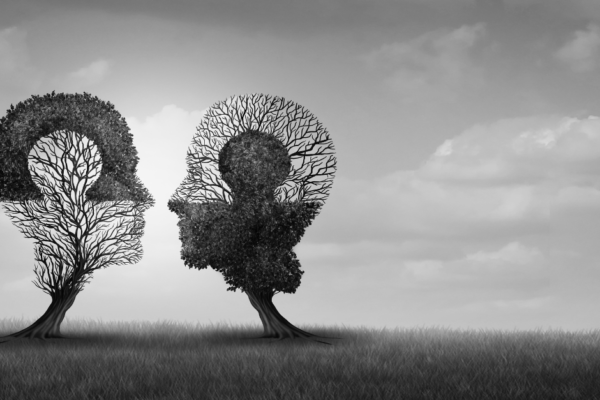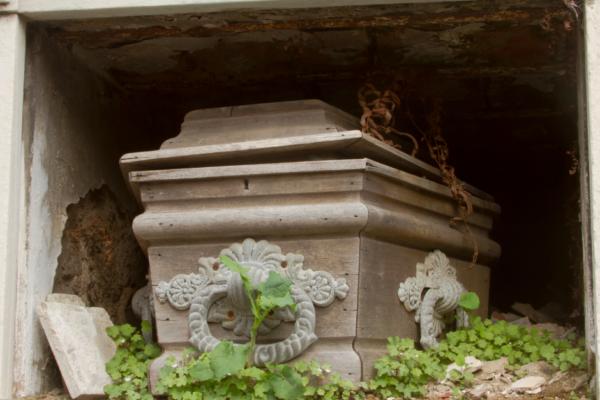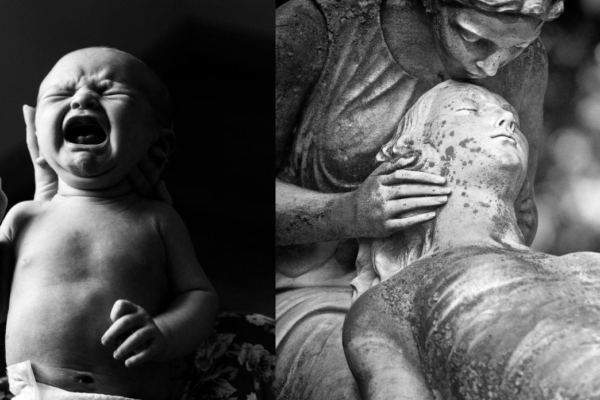By Shelley Whizin
“Grief can be the garden of compassion.
If you keep your heart open through everything,
your pain can become the greatest ally in your life’s search for love and wisdom.”
-Rumi
When a loved one dies, we go through certain key stages of grief. We experience a variety of emotions. Being kind and patient with oneself and others during this delicate moment and after someone passes from this physical realm is essential.
One experience we will go through is grief, a common reaction to a major loss. My goal for this article is to help you understand grief by exploring the “Five Stages of Death and Dying” as named by Elisabeth Kubler-Ross in her book, On Death and Dying. You’ll learn how going through these stages can ultimately lead to a sense of healing.
One definition of grief is “a multifaceted response to loss, particularly to the loss of someone or something that has died, to which a bond or affection was formed.
” Another definition states, “Although conventionally focused on the emotional response to loss, grief also has physical, cognitive, behavioral, social, and philosophical dimensions.”
There is no one “right” way to grieve because everyone is different. There is no way to anticipate exactly how or when the feelings of sadness, anger, loss, and loneliness will heal. Grief can even be expressed in anticipated deep sorrow, caused by someone’s imminent death.
Grief can feel like an unstoppable roller coaster, but over time it will even out. The big ups and downs might come back during special family events or anniversaries. However, with the support of friends and loved ones, grief gets more manageable with time.
Loss, Love, and Life
Loss is a noteworthy feeling. It can mean different things, depending on the experience. When we lose weight, we are happy. When we lose someone we love, that’s a whole other story. The first feeling of loss occurs at the beginning of our lives when we lose our mother’s womb. We feel vulnerable when we arrive in a vast world we do not know. As we grow, we lose our toys, friends, teachers, youth, innocence, and even our childhood dreams.
As our lives unfold, we continue to experience loss in many ways. It includes losing our cars, jobs, money, relationships, houses, and loved ones, including our precious pets.
Nothing in this world is permanent. Everything is transitory, even our physical bodies. When we accept this reality, it might help us to appreciate the good things in life.
The strange thing about experiencing loss is that we would not feel loss if we did not love. They go hand in hand. One of the most challenging life lessons is loss, primarily because it stems from love. If we never loved anyone or anything, we would never experience loss. Remember the line from Alfred Lord Tennyson, “‘Tis better to have loved and lost than to never have loved at all.”
..we would not feel loss if we did not love
The paradoxical aspect of having a lot of loss in life is that it also means we’ve had a lot of blessings. It’s normal to feel like you’ll never recover after experiencing a loss, but with time, it is possible to heal.
When our loved ones are dying and we hide our sorrow from them, they can sense it. They know what difficulties they’re facing. It’s critical to vocalize our feelings rather than pretending these events aren’t happening. However, everyone copes with it in their way.
When we experience an illness ourselves and are waiting for a prognosis, we begin to mourn the loss of our health and the potential loss of our own life. When we await a test result, we almost lose our minds thinking about the worst possible scenario. I know for when the doctor said to me, “You have breast cancer,” in 2003, I thought he was talking about someone else. My initial reaction was, “You talkin’ to me?”
Stages of Death and Dying
In the sixties, Elisabeth Kubler-Ross, a Swiss American psychiatrist, was working with patients who were dying. With intense curiosity she focused on the patient as a human being and included them in dialogues, to learn their strengths and weaknesses.
After two and a half years of working with dying patients, she interviewed 200 patients and was asked to write a book. In 1969, Ross wrote On Death and Dying, a groundbreaking book that would become the foundation for understanding. She believed everyone goes through these five stages of death and dying during the grieving period: DENIAL, ANGER, BARGAINING, DEPRESSION, and ACCEPTANCE (Acronym: DABDA).
Ross went on to describe that each stage was an important part of our healing process. And these five stages did not occur in any order, nor did they occur in every person she studied. She recognized that grief was as individual as our individual lives.
All five stages: denial, anger, bargaining, depression, and acceptance, can be applied to all losses in life. It’s also pertinent to remember that whatever stage we’re at is precisely what we’re supposed to be experiencing, whether it be emptiness, helplessness, immobility, paralysis, worthlessness, rage, sadness, or dread.
‘No growth without loss’
I feel that pushing anyone who is grieving to do anything prematurely is pointless, and that it’s better to wait till they’re ready. Over time, things will certainly get better, even if the journey there is a bit bumpy. Loss is one of the most challenging lessons in life, but as Ross explains, “there is no growth without loss, and there is no loss without growth.”
We learn from every loss and become more of who we are. For example, a caterpillar loses its entire body but metamorphoses into a butterfly.
People who have had near-death experiences, they say that death is only shedding the physical body. They remember having had a sense of wholeness in their death experience; feeling connected to everything, not experiencing a sense of loss at all, nor feeling alone. They felt supported. It is we who feel their loss of them.
Loss has a way of unifying us and deepening our understanding of each other, connecting us in a way that maybe no other lesson in life can. Experiencing a loss affects many lives: the family, coworkers, caregivers, and extended loved ones. Even professionals feel the loss of someone they are caring for. Shared loss teaches us more compassion for one another. The only thing as challenging as loss is wondering if there is going to be a loss. There are times when we exist in a state of uncertainty, and being in that situation is itself a loss.
How to Stop Feeling Guilty
When a loved one is dying, feelings of guilt can arise when we don’t express our feelings of the potential loss. Thinking we don’t have the right to be paid attention to since our loved one is the one who is dying, we feel guilty for having these emotions in the first place.
‘Take time to mourn’
Sometimes we get conflicted with the loss of loved ones, especially if we didn’t have a great relationship with them in the first place. We grieve and mourn for those who cared for us, and we also grieve and mourn for those who did not give us the love we desired or needed.
What is important is to feel the loss and take time to mourn and acknowledge that those losses cannot be negated, even if we think the person did not deserve our love. It is important to remember that we all heal in our own time and in our own. Healing continues to happen.
We often react to the pain of loss by pushing others away, detaching ourselves, or becoming so self-sufficient that we don’t “need” anyone else. We abandon ourselves and don’t let anyone see our loneliness. On some level, we do this so we can heal. We may unintentionally create loss by attempting to avoid it. We keep people at arm’s length, which is its own sort of loss.
Loss is often an initiation into adulthood, a rite of passage, so to speak. We walk through the fire to the other side and somehow, we are changed. And the only way out of the pain is through the pain. As in the oceans of life, the tide comes in and goes out, just like our emotions. So, how, you may ask, is BEing conscious of grief a gift?
By identifying grieving through these stages within ourselves, we can see that they are coping mechanisms to learn how to live with the reality of losing the one we loved. They serve as tools to help us frame and identify what we may be feeling and allow us to notice where we are in the process.
The Five Stages of Death and Dying.
DENIAL
The stage of DENIAL helps us to survive the loss, when the world becomes seemingly meaningless and overwhelming, when life seems to lack purpose. There are times when all we can feel is shock and disbelief. Our minds shut down the pain to protect us, making us numb and questioning why we should go on living. It’s like a buffer-nature’s way of giving us time to process what happened.
Once you accept the reality of the loss and begin to ask yourself questions, you are unknowingly beginning the healing process, which is a way to the heart. You become stronger and the denial begins to fade, and all your feelings begin to surface.
ANGER
ANGER is an emotion that stirs up everything. We want to blame someone, anyone, even the person who has left us. Anger is a necessary stage in the healing process as well. So, it’s important to allow yourself to feel your anger, even though sometimes it may seem endless. But the more you truly feel it, and not judge it, the more it will begin to dissipate and the more you will heal.
Anger may be the tip of many other emotions that lie underneath, which will surface in their own time. Anger can sometimes feel as if it has no limits…and can be extended to everyone involved, including God, (if you believe in God) asking, “Where is God in this?”
Be assured that this is a normal response that can become a bridge and a connection made from strength, something to hold onto that feels better than nothing. Anger may also arise when your relationship with the dying person was not what you had hoped for, or because they were suffering from dementia and could not communicate.
BARGAINING
Sometimes, before your loved one dies, you may find yourself in another stage called, BARGAINING. You may even find yourself bargaining with God (again, if that is your belief). “Please God, I will never be angry at my wife or husband (or loved one) again, i you will just let them live.” You may find yourself wishing it was a bad dream and if you woke up it would be different.
In this phase, we become lost in a maze of “If only…” or “What if…” statements. We want life to be the same as it was, and want our loved to be healthy and happy again. We want to go back in time to do whatever was needed to avoid that illness or prevent that accident from happening.
Unfortunately, guilt is often bargaining’s companion. We begin to find fault in ourselves, and what we “think” we could have done differently. We even want to bargain the pain away that feels like it will last forever. These stages ebb and flow.
DEPRESSION
Once we realise that bargaining is not working, our attention moves to the present and we feel empty. Grief seems to enter our lives on an even deeper level, and this DEPRESSED stage feels as though it will last forever.
This feeling of depression is a temporary situation and is an appropriate response to a great loss. During this stage, we may even withdraw from life, left in a fog of intense sadness, wondering if there is any point in going on alone.
And, judgment can creep in here too, making us think we should just snap out of it. Telling that there is something wrong with us, that we need to be fixed. We say to ourselves, “I should be over it by now,” or worse yet, others say the same thing. There is never really getting over a loved one dying. It’s carrying on with life as much as possible. Realizing that your loved one is not coming back is understandably depressing, and another necessary healing step along the way.
ACCEPTANCE
ACCEPTANCE is sometimes misinterpreted as the notion of giving up and being “OK” with what has happened. Most people don’t feel OK or alright about the loss of a loved one. But this stage is about the reality that our loved one is physically going or is gone, and life will never be the same. Even though we may not like this new reality, we eventually accept it and learn to live with it. It has become the new norm.
At first, many people want to maintain life as it was before a loved one died. As time passes, we learn to reorganize roles, reestablish our identities and find out who we are without them.
Think of a mobile, hanging in perfect balance, with all the pieces of the mobile in their positions. Take one piece away, and what happens?
The mobile scurries to find a new balance without the piece that is missing. Every piece in the mobile must vie for a new position, a new way of being, because that one piece that balanced everything out is gone.
It can be difficult to focus on your thoughts, but it is important to be kind to yourself. While it’s natural to feel guilty for enjoying your life after the loss of a loved one, know that you are not betraying them by doing so.
Although you can never replace the one you lost, you can make new connections, new meaningful relationships, and new interdependencies. You begin to listen to your needs. You recognize it is time to move, change, grow, evolve, and even reach out to others and become involved in their lives. In time, you will start to live again and allow grief the space it needs to heal.
…Grief is the Midwife of your capacity
Stephen Jenkinson, a Harvard graduate in social work, and founder of Orphan Wisdom School in Canada is a though-provoking leader in palliative care and hospice. He says that “grief is the midwife of your capacity to be immensely grateful for being born.”
Learning that we experience loss every day as human beings is important in putting things into perspective. Naturally, the loss of human life is huge, especially when we are emotionally attached to that person, but that loss is also a natural phenomenon in life.
When we “lose” someone we love, we lose their physical presence, but can always hold them in our hearts. It is crucial that we can move on by finding the authentic parts of ourselves and our loved ones that remain; the love we have given can never be lost.
Conclusion
Life goes in cycles–for every ending, there is a new beginning. The situation you are currently facing is the end of some aspects of your life, similar to how babies must leave the womb eventually.
Take it one step at a time, one breath at a time, and enjoy the time you have with your own life, and the people you love.
If we come to terms with the fact that life is fleeting and sometime in the future, death will claim us all, then life becomes more meaningful. It’s more than just bearing witness to existence–we feel gratitude, compassion, love, and worthiness.
It’s up to us how we live our lives and how we handle life and existence, as well as death and dying with grace. We’ve discussed how grief is a natural part of the human experience, whether we’re in denial, rage, bargaining, depression, or acceptance.
It’s your life. Enjoy the journey. And, remember to bring love into everything you do.
Book your 30-minute session with Shelley Whizin









